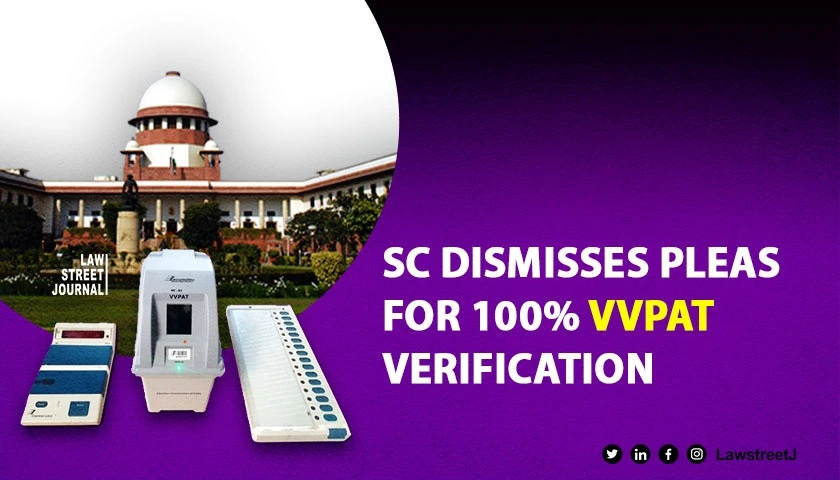NEW DELHI: The Supreme Court on Friday rejected a plea for making 100% cross verification of VVPAT counts with EVMs or returning back to ballot papers during the elections.
The top court advised all naysayers of EVMs to indulge in evidence based criticism for improvements and avoid blindly distrusting the system, which would lead to unwarranted scepticism.
Also Read - Can't control elections or issue directions on suspicion: SC
A bench of Justices Sanjiv Khanna and Dipankar Datta unanimously dismissed the petitions filed by NGO Association for Democratic Reforms and others.
The court, however, issued two directions that containers carrying the symbol loading unit should be sealed in the presence of polling agents and candidates and should be secured for a period of 45 days.
The Control Unit, Ballot Unit and VVPAT should be verified by engineers of the manufacturing companies post the result of the counting on a written request by a candidate to be made within 7 days of the declaration of results, the court said.
The expenses would be borne by the candidates making the request and in case the EVM is found to be tampered with the expenses should be refunded.
The bench said it passed the directions after going through the EVMs and VVPATs protocols.
In its judgment, the top court said, "Our approach should be guided by evidence and reasons to allow space for meaningful improvements by nurturing a culture of trusts and collaboration."
Also Read - SC seeks clarifications from EC on EVMs
"By this, we can strengthen the foundation of our democracy and ensure that voices and choices of all citizens are valued and respected. With each pillar fortifying our democracy, it stands as robust and resilient," the top court said.
In his separate judgment, Justice Datta emphasised that democracy is all about harmonising trusts. He hoped the system will come upto the expectation of people.
Coming up with additional reasons to dismiss the pleas, he said, while maintaining a balance perspective is essential in evaluating systems or institutions, blinding distrusting any aspect of the system can lead to scepticism and impede progress.
"Instead, a critical and constructive approach guided by evidence should be followed to make a room for meaningful improvements and to ensure the system's credibility and effectiveness," he said.
"Be it citizens, the judiciary and elected representatives or even the electoral machineries, democracy is all about building harmony and trust between all its pillars, to open dialogues, transparency in process and continuous improvement of the system by active participation in democratic practices," Justice Datta said.
"I hope and trust the system shall not fail the electorate and the mandate of voting public shall be fully reflected in the votes cast and counted," he added.
Also Read - Everything cannot be suspected; sanctity of the electoral process to be maintained: SC
Reacting to the judgment, NGO ADR's counsel Prashant Bhushan said the court has not accepted our demands but has directed the Election Commission to examine that if bar codes can be put on VVPAT slips, so that the VVPAT slips can be mechanically counted by a counting machine.
Also, secondly, they have said that the symbol loading unit which loads the symbol constituency by constituency should be sealed and kept available for at least 45 days after the election.
Thirdly, they have said that every candidate who comes second or third can make a demand for examining the burnt memory of the EVM and a technical expert team of the Election Commission will have to examine that, but the cost of that will have to be paid by the candidate. With these directions, the court has disposed of the petition, he told reporters.
On April 24, the apex court had reserved its judgement after hearing Deputy Election Commissioner, EC's counsel senior advocate Maninder Singh and a battery of advocates Prashant Bhushan, Santhosh Paul, Sanjay Hegde and others for the petitioners.
The court had then said it can't control election or be a controlling authority of another constitutional body, Election Commission and it can't act only on the basis of suspicion as not a single instance of mismatch between EVM and VVPAT data has been shown.
It had also noted till date there has been no incident of hacking identified and if there is some incident, law provides what is to be done.
The court also said any candidate in the polls can show if there was any mismatch in the 5% VVPATs counted.
Also Read - 'We all know what happened when there were ballot papers,' SC on return of ballot papers or 100% VVPATs count
The petitioners, on their part, had contended the voter has right under Article 19 and 21 of the Constitution to cross verify vote as cast by him and counted by paper vote of VVPAT in accordance with the purport and object of directions of this Court in Subramanian Swamy case (2013).
In 2019, the SC had directed for raising the VVPAT counts from one to five randomly selected machines in an Assembly segment.
The petitioners said cross-verification and counting of all VVPAT slips is essential to the interest of democracy and the principle that elections must not only be free and fair, but also be seen to be free. They also said while the government has spent nearly Rs 5000 Crores on purchase of nearly 24 lakh VVPATs, presently VVPAT slips of only approximately 20,000 is verified.

















